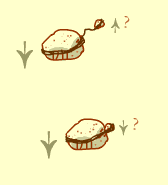
|
 |
Thought Experiment
To show the improbability of Aristotle's view, Galileo came up with the following thought experiment. Two stones—one light, one heavy—are in a free fall. The heavy one, according to Aristotle, drops faster than the light one. But what would happen if the two were tied together? Would the lighter one pull up on the heavier one, resulting in a slower fall? Or would the two work together as a heavier object and fall faster? The argument can be taken further. What if the two stones were not tightly bound together but just connected by a rope? Would the two stones then "know" that they were connected and thus fall faster (or slower)? The answer, of course, is that it doesn't make sense that a falling lighter object could pull down (or up) on a heavier object, or that it's possible that an object knows when it's connected to another.
This wraps up the Falling Bodies experiment, but there are other Galileo experiments to explore. Make another selection.
|

